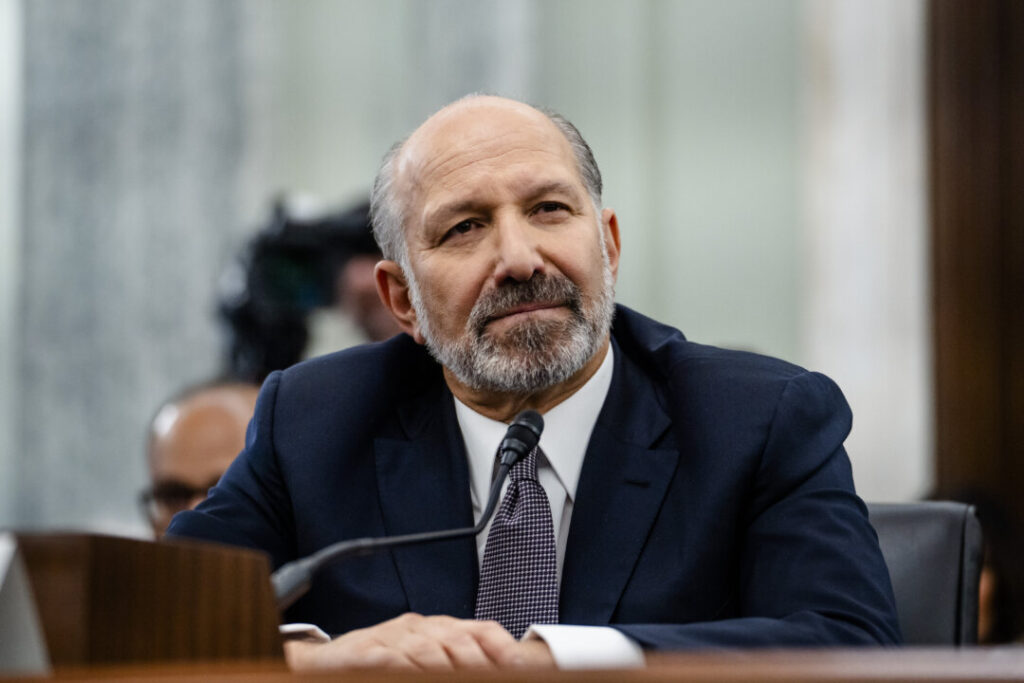Howard Lutnick’s remarks echo what Elon Musk, director of the Department of Government Efficiency (DOGE), said last week on X.
The Trump administration can rule out government spending from future GDP reports, says Commerce Secretary Howard Luttonick.
“We know that the government has historically ruined GDP,” Lutnick said in an interview with Fox News’ Sunday Morning Futures.
“They count government spending as part of their GDP, so I’m going to separate these two and make them transparent,” he said.
For example, the US government that buys tanks is contributing to gross domestic product, but paying staff to consider purchasing the same tank “is not GDP,” he said.
“It’s waste and inefficiency. We’re going to get rid of it,” Lutnick added.
Lutnick’s remarks echo what Elon Musk, director of the Department of Government Efficiency (DOGE), said last week on X.
In response to a post about the collapse of GDP forecasts in the first quarter, Musk said a better gauge of GDP would eliminate government spending.
“If not, we can artificially increase our GDP by spending money on things that don’t make people’s lives better,” Musk said.
“For example, you can move everyone who’s building a car to work on a DMV. As a result, there are no cars and a worse standard of living, but GDP looks the same!”
Over the years, many economists have expressed their dissatisfaction with GDP, calling it a flawed and misleading tool for judging economic health.
In his inventive 1949 book, Human Action, prominent economist Ludwig von Mises pointed out that estimating the wealth of a nation as a whole is a futile effort.
“An attempt to determine the wealth of a nation or the whole of mankind with money is as childish as the mystical effort to solve the riddles of the universe by worrying about the dimensions of the pyramid of Chops,” he wrote.
But new concerns about GDP growth begin, but Lutnick says he is optimistic that the new administration will balance budgets with low interest rates to strengthen the economy.
“This will be the best economy anyone has seen, and it’s stupid to oppose it,” he said.
Understanding GDP
GDP measures the total value of goods and services produced in the economy over a specific period.
Government spending has long been inserted into GDP calculations as government deficits, expenditures and tax adjustments can affect economic activity.
Over the past few years, federal spending represents a larger share of GDP growth. In 2024, net federal spending as a percentage of GDP was over 23%. By comparison, they were about 20% before the pandemic.
Furthermore, government spending generally accounts for about a fifth of the $24.6 trillion personal income of ordinary individuals last year. This indicator features benefits or payments from Social Security, Medicare, Medicaid, and other federal programs.
“It was 4.8% in the third quarter, down from almost 7% the previous year,” the department said.
Data Trends
Recent management efforts to reduce the size of federal agencies could result in layoffs of federal employees, which could have a broader impact on the US economy.
However, while Doge-related efforts have gained the national spotlight, the end of federal staff has not yet been featured in labor data.
Marketwatchers were waiting for a fired federal employee to appear in their initial unemployment claims data. However, experts say that fired federal employees are not included in the state’s claims statistics and will instead appear in the unemployment compensation for the Federal Employees (UCFE) program.
This data point indicates 614 initial billing for the same period.
As for the wider economic landscape, the recession talk has returned to Wall Street.
Compared to other metrics, the Atlanta Fed tools are outliers.
The “Trump Session” story is attracting public attention as economists discuss the risks of male dogs. This is a fusion of stagnant growth, increased unemployment and rising inflation. Other market observers say the recent uncertainty that hit Wall Street is merely noise.
Either way, “get your hard hat ready,” says Mark Malek, CIO at Siebert Financial.
“It was clear that Trump was serious, so we should be careful,” Marek told the Epoch Times in a memo sent by email, adding that there are many variables.
“Will these tariffs be long enough to affect prices? Will all this worry continue to disrupt consumer confidence and consumption, and there could be a recession? What about the Fed?” he said.
“Well, the people in Big Bank are certainly nervous right now. They know that inflation is due to tariffs, and they also know that lower confidence and consumption can cause a decline in the economy.”



